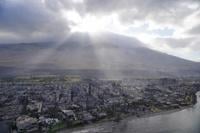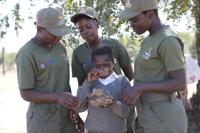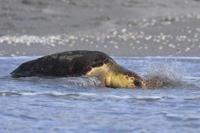VICTORIA - British Columbia millionaire Eric Peterson is preparing to do something he's never been comfortable with — ask other very rich people for money.
Peterson and his wife, Christina Munck, have spent the last two decades funding their Tula Foundation through proceeds from the sale of his medical imaging company.
The couple announced the donation of their last $92 million from the sale on Wednesday, and they are now making plans to keep the organization sustainable after that money is gone.
Peterson said in an interview that he envisions having to divide up the foundation’s eclectic list of projects to find funding partners for the individual pieces, which range from the Hakai Institute, that researches Canadian coastal ecology, to a branch working on health care in Guatemala.
“I am not very comfortable to go out there and ask for donations. ‘Give me money. I'm already filthy rich, give me more money.’ That's not a very compelling argument, is it?” he said.
“But now that we're saying, 'Look, this is an organization we've given all of our resources to it, we would really appreciate if there are other donors who can help to make this sustainable.'”
Peterson and Munck began the Tula Foundation, named after one of their dogs, after he sold his company, Mitra, for an estimated $300 million in 2001.
At a media event Wednesday, he said one of the first pieces of advice that he got after the sale was that they would feel like idiots if they died with money in the bank.
Peterson said in the interview that the range of projects supported by the foundation, which also includes the Environmental Law Centre at the University of Victoria and media company the Tyee, makes it unlikely that they will find one funder willing to take over the entire portfolio.
"It is a strange sort of a conglomerate of things … and it's sort of tied together by our personal interest," he said.
"We really have a feeling that probably what we need to do with the various entities within Tula is we probably need to divide them up a little bit and work on making them individually sustainable."
He said some of the projects already get government grants along with foundation support and the foundation has many potential partners in governments, First Nations, or universities that could be interested.
The couple has also transferred two parcels of land totalling 22 hectares to the BC Parks Foundation for future incorporation into the Hakai Luxvbalis Conservancy, which is collaboratively managed by the province and the Heiltsuk and Wuikinuxv First Nations.
The two pieces of land surround the Hakai Institute on remote Calvert Island on B.C.'s central coast.
Peterson said a third piece of land, where the research institute sits and is run by the foundation, is more "complicated" to find someone to take on, complete with its docks, solar energy system and accommodations for 100 people.
"It's difficult to run, it's expensive to run, but incredibly valuable. And so, I think what we need to do is emphasize the value and emphasize the fact that we can't carry that forever," he said.
"I think we're going to need to be there as a continuing presence. It's just over the long term, we can't handle 100 per cent of this burden, and we shouldn't."
— By Ashley Joannou in Vancouver
This report by ������ϲʹ������� was first published March 13, 2024.






































